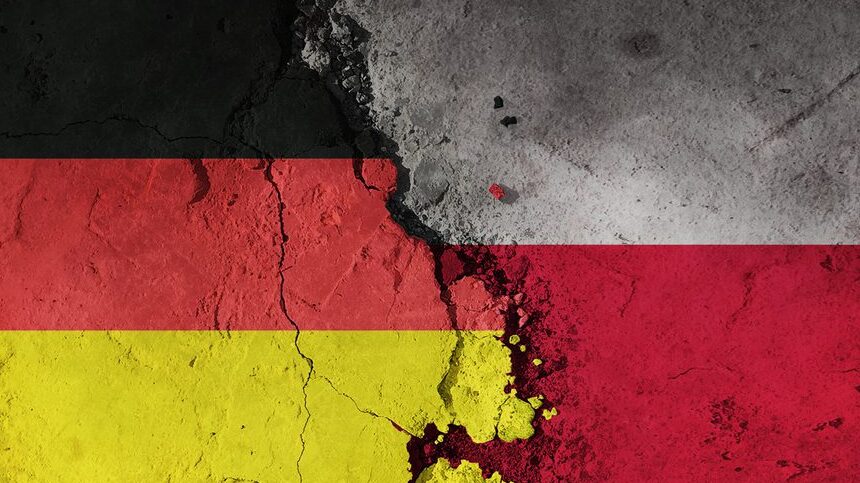
The fact that the left-liberal government of Germany and the centrist leadership in France are hoping for a less confrontative government in Warsaw after the Polish elections on October 15th should come as no surprise, but they may be more actively engaged in bringing about such a change, according to a pro-government Polish journalist and a former Polish Prime Minister.
Polish public broadcaster TVP’s Brussels correspondent Dominica Cosic claimed on Monday, September 25th, that “according to off-the-record conversations in Brussels, Germany and France allegedly promised Ukraine a fast entry to the EU if Kyiv helps overthrow the current Polish government.” Berlin and Paris have apparently told Kyiv that in order for Ukraine to be accepted as a member of the EU, treaty changes would need to be made, “which are being blocked by Poland.”
1. W Brukseli mówi się nieoficjalnie, że ponoć Niemcy i Francja obiecały władzom Ukrainy szybkie wejście do UE jeśli Kijów pomoże w obaleniu obecnego polskiego rządu. Motywują to tym, że bez zmiany traktatów nie można rozszerzyć UE, a to Polska blokuje te zmiany.
— Dominika Cosic (@dominikacosic) September 25, 2023
However, according to Dominica Cosic, new countries can already be admitted to the EU based on existing treaties, and the real reason Germany and France are seeking to amend the treaties is “solely to increase their powers and the powers of EU institutions.”
Reacting to the allegations, former Polish Prime Minister Beata Szydło—currently a Member of the European Parliament for the governing party PiS—confirmed that “the German authorities are currently focused on making a fast change in the European Treaties, to make the EU a federal state.” As the Polish government “will oppose turning Europe into a federation” governed from Berlin, German politicians “would like to see a change in government in Poland,” she wrote on social media platform X, adding: “Is Germany ‘buying’ Ukrainian authorities with the promise of fast entry to the EU? It is possible.” Szydło believes accepting an offer of fast entry to the EU in exchange for helping change the government in Poland would be “extremely naive” on the part of Kyiv.
Odnosząc się do medialnych doniesień nt. wciągnięcia Ukrainy przez Niemcy do działań przeciwko polskiemu rządowi: Tak, priorytetem dla władz Niemiec jest teraz szybka zmiana Traktatów Europejskich, żeby Unia stała się państwem federalnym, gdzie kraje członkowskie będą sprowadzone…
— Beata Szydło (@BeataSzydlo) September 25, 2023
As The European Conservative previously reported, France and Germany are jointly proposing a deep reform of the European Union to match the challenges of EU expansion—with as much as ten countries, including Ukraine, possibly entering the bloc in the next decade or so. The reform would result in the elimination of national vetoes, with qualified majority voting to be put in place to remove obstacles in decision-making. The proposal also advocates for a layered membership in which some countries have more weight than others.
The conservative, sovereigntist governments of Hungary and Poland have been a thorn in the side of Western liberals and EU institutions, frequently opposing common approaches, such as migration and taxation issues. The Polish Constitutional Court even went so far as to declare that national law has primacy over EU law, a move which outraged liberals in Brussels. It is no wonder that the two renegade countries are the only EU members not to have received their share of EU recovery funds.
To the detriment of Berlin and Paris, the ruling Polish party Law and Justice (PiS) is expected to win its third consecutive parliamentary elections, and may even form a coalition with the right-wing party Konfederacja, a eurosceptic party that is strongly critical of the government’s support of Ukraine. With the election campaign intensifying, PiS has also hardened its stance with regard to Ukraine, first banning the import of Ukrainian grain in defence of Polish farmers, and then announcing the halt of weapon supplies to its neighbour which is at war with Russia.
In response to allegations of colluding with France and Germany against Poland, Ukraine’s ministry of foreign affairs stated that “the Ukrainian side has not received any such proposals and has no intention of interfering in Poland’s internal affairs.”
Western liberals are pinning their hopes on former Prime Minister Donald Tusk, a former President of the European Council and current leader of the main opposition party, centrist Civic Platform (PO) to shake off Poland’s strong ties with Hungary and bring the country back to a closer alliance with Western Europe. According to the latest polls, PO is trailing PiS by 7 percentage points, but may still be able to build a coalition with leftist, liberal, and centre-right parties.
